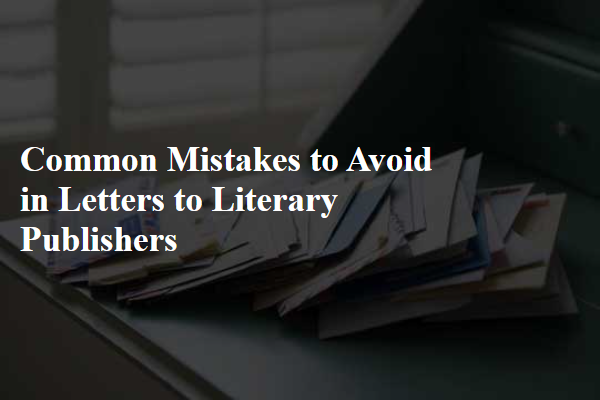
Avoiding common mistakes in letters to literary publishers is crucial for making a strong impression, such as neglecting to follow submission guidelines precisely. Writers often fail to personalize their letters, which can come across as generic and unengaging. Ensuring clarity, professionalism, and adherence to the publisher's specific requirements increases the likelihood of a positive response.
Submitting Unpolished Manuscripts
Common mistakes in letters to literary publishers include submitting overly lengthy or poorly formatted queries that fail to capture the editor's attention. Writers often neglect to research the publisher's specific submission guidelines, leading to immediate rejection. Errors in grammar, spelling, or lacking a concise synopsis also reduce the chances of a positive response from literary agents and editors.
Ignoring Submission Guidelines
Submitting poorly formatted manuscripts is a frequent mistake that can diminish a writer's chances with literary publishers. Overly lengthy or irrelevant cover letters often fail to capture the editor's interest and should be concise. Neglecting to research the publisher's submission guidelines results in immediate rejection, highlighting the importance of tailored letters.
Using Generic Cover Letters
Letters to literary publishers often suffer from overly generic introductions that fail to capture the editor's interest. Writers should personalize each letter to demonstrate familiarity with the publisher's catalog and editorial focus.
Another common mistake is including excessive background information unrelated to the manuscript. Concise, relevant details about the work and the author's credentials maintain clarity and professionalism.
Overstating Writing Credentials
Writing letters to literary publishers requires careful attention to detail and professionalism. Avoiding common mistakes can significantly improve your chances of a positive response.
- Using a Generic Greeting - Personalizing the salutation with the editor's or publisher's name demonstrates professionalism and genuine interest.
- Submitting Unsolicited or Incomplete Manuscripts - Sending full manuscripts instead of adhering to submission guidelines wastes time and reduces consideration chances.
- Overlooking Proofreading - Errors in grammar and spelling undermine credibility and distract from the quality of your writing.
Addressing the Wrong Editor
| Mistake | Description | Impact | How to Avoid |
|---|---|---|---|
| Generic Salutation | Using vague greetings like "Dear Sir/Madam" instead of addressing the specific editor or publisher. | Shows lack of research and personal interest, reducing chances of engagement. | Research the publisher's team and use the correct name and title. |
| Overly Long Letters | Submitting lengthy letters without clear focus or purpose. | Can overwhelm the reader and obscure key points. | Keep letters concise, typically one page, focusing on essential information. |
| Ignoring Submission Guidelines | Failing to follow the publisher's specific rules for formatting, file types, or content. | Often leads to immediate rejection regardless of content quality. | Thoroughly review and adhere strictly to the publisher's submission instructions. |
| Lack of Personalization | Sending identical letters to multiple publishers without customization. | Appears impersonal and decreases perceived effort and professionalism. | Tailor each letter to reflect familiarity with the publisher's catalogue and interests. |
| Failing to Proofread | Submitting letters with spelling, grammar, or typographical errors. | Damages credibility and suggests carelessness. | Carefully proofread multiple times or use professional editing services. |
| Unclear Purpose | Not clearly stating the purpose of the letter, such as submitting a manuscript, query, or proposal. | Confuses the editor and lowers response likelihood. | Clearly state your intent early in the letter and summarize what follows. |
| Insufficient Author Background | Omitting relevant credentials or previous publications. | Reduces the publisher's confidence in the author's experience and marketability. | Include concise, relevant author biography or previous publication highlights. |
| Inappropriate Tone | Using either overly casual or excessively formal language that does not fit the publisher's style. | May alienate the reader or appear unprofessional. | Match the tone to the publisher's brand and maintain professionalism. |
Failing to Research the Publisher
Writing letters to literary publishers requires precision and professionalism to make a positive impression. Avoid common mistakes that can undermine your credibility and reduce your chances of success.
- Failing to follow submission guidelines - Not adhering to the publisher's specific instructions can result in automatic rejection.
- Including excessive personal information - Overloading the letter with irrelevant details distracts from your work and appears unprofessional.
- Neglecting to proofread - Spelling and grammatical errors signal carelessness and diminish the quality of your submission.
Being Overly Demanding
When submitting letters to literary publishers, avoid generic greetings and impersonal introductions that fail to engage the reader. Tailoring your letter to each publisher demonstrates professionalism and genuine interest in their specific publications.
Ensure your letter is concise and clearly outlines your manuscript's genre, theme, and uniqueness without overwhelming details. Overly lengthy or vague letters can cause publishers to lose interest quickly.
Neglecting Proper Formatting
What are common mistakes to avoid in letters to literary publishers?
Many writers fail to personalize their letters, making a generic impression that reduces their chances of acceptance. Ignoring submission guidelines or including irrelevant information often causes letters to be overlooked.
Sending Mass or Impersonal Emails
Submitting letters to literary publishers requires careful attention to detail to make a positive impression. Common mistakes can undermine the professionalism and effectiveness of your correspondence.
One frequent error is failing to personalize the letter, which may suggest a lack of genuine interest in the publisher's work. Overly long or unfocused letters dilute your message and reduce the chances of a response. Neglecting to follow submission guidelines or including irrelevant information can lead to immediate rejection.
Omitting a Clear Pitch or Synopsis
Writing letters to literary publishers requires careful attention to detail to make a positive impression. Avoiding common mistakes can increase the chances of your manuscript being considered seriously.
- Overly Generic Greetings - Using impersonal salutations like "To Whom It May Concern" can suggest a lack of research and interest in the specific publisher.
- Excessive Length - Long, rambling letters can lose the reader's attention and obscure the key points about your work.
- Ignoring Submission Guidelines - Failing to follow the publisher's specific instructions can result in immediate rejection regardless of content quality.
Careful formatting, personalization, and clarity enhance the professionalism and effectiveness of letters sent to literary publishers.



Comments